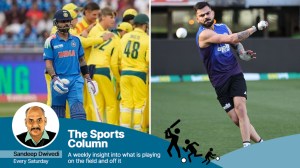Stay updated with the latest - Click here to follow us on Instagram
For him, rainy nights are time to ensure Mumbai traffic rules are followed
As a sub-inspector at Colaba traffic division, Kadam’s night begins with reporting to work at 8 pm and preparing for a traffic bandobast three hours later.
 For traffic cops, rainy nights mean slippery roads and more chances of accidents. (Source: Pradip Das)
For traffic cops, rainy nights mean slippery roads and more chances of accidents. (Source: Pradip Das)
There is a long night ahead and Samuel Kadam prepares for it by wearing a two-piece yellow raincoat. In the downpour, the city is returning home and one of Kadam’s varied responsibilities tonight is to see that these journeys go smoothly.
As a sub-inspector at Colaba traffic division, Kadam’s night begins with reporting to work at 8 pm and preparing for a traffic bandobast three hours later. In the intervening hours, he catches up with colleagues and takes care of paperwork and attends to motorists seeking the release of their impounded vehicles.
By quarter to eleven, it is show time and it matters little that the rain has just increased in ferocity. Kadam leads four other men and one woman at a drunk driving nakabandi outside the lion’s gate. This and the Bombay City Civil and Sessions Court are the only two fixed points where they alternate nakabandis.
“We don’t have a lot of traffic here at night since this is an office area,” Kadam says. At 57, Kadam is winding down a nearly four-decade career and his current posting will be his final one.
[related-post]
Watch Video: What’s making news
With four years in the traffic police behind him, Kadam says things can get busy in monsoon months. “Every time a tree falls, we have to create diversions or a long jam will form,” he adds.
His area of responsibility is relatively less congested as compared to the suburbs, and some of the major calls the traffic police face are snarls due to poorly parked cars.
“People who come to visit the Gateway of India park their cars in the middle of the road and go. Since the road is very narrow, we have to get the cars out of the way promptly,” he says.
Colaba Divison is considered a peaceful posting. Kadam has experienced none of the hectic nights that he spent working in suburban and central Mumbai.
“One night at Dadar, a man came told me that a car was parked in the middle of the road at Shivaji Park. I couldn’t believe it so went with him and saw that the door wasn’t locked and the keys were in the ignition. So we sat inside the parked the car at the side of the road,” he recalls.
The bandobast wraps up at 2 am and aside from a young man fined for a not wearing a helmet, the only brief moment of excitement is provided by a biker who slows down upon seeing the barricades and the police waiting for him.
The U-turn outside the residence of the vice-admiral of the western naval command is blocked by a rain-soaked constable, so the biker simply turns his vehicle around and zooms away before the constable can yell out and pursue.
“It is dangerous to run after a biker in the rain. What if he skids? We cannot take that risk,” the constable says.
The night passes without any further event. “Every time a car approaches, we do not know if the driver is drunk,” he says.
Have a comment or suggestion for Night Shift? Write to mumbai.newsline @expressindia.com with subjectline: Night Shift







